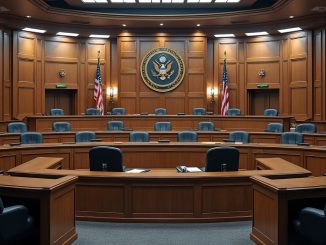
Britain’s Competition and Markets Authority (CMA) on Tuesday launched an investigation into Google’s search services, utilizing the newly enacted Digital Markets, Competition, and Consumers Act (DMCC). This probe signifies the first significant application of the new competition rules which aim to curb anti-competitive practices within digital markets. The focus is on whether Google holds “strategic market status” (SMS), a designation that could empower the regulator to enforce changes to ensure fair competition.
The concern stems from Google’s overwhelming dominance in the UK search market, commanding over 90% of all general search queries. This position not only influences how businesses connect with consumers but also how data is managed and utilized for developing new AI technologies. Sarah Cardell, CMA’s chief executive, emphasized the importance of maintaining a “level playing field” amidst the transformative impact of AI on search functionalities. This investigation seeks to protect consumer choice, data privacy, and promote innovation by ensuring that no single entity can skew market dynamics to its advantage.
Parallel to this, the CMA is wary of Google’s potential to stifle emerging AI-based search competitors like OpenAI and Perplexity, which could challenge Google’s market position if given a fair chance to grow.
Simultaneously, on the international front, there’s a curious twist involving TikTok. Bloomberg reported that the Chinese government is considering a plan where Elon Musk might acquire TikTok’s U.S. operations to prevent its potential ban under a law passed by President Joe Biden. This law, set to enforce ByteDance’s divestiture of TikTok’s U.S. business by January 19, 2025, has led to strategic maneuvering by China to keep TikTok operational in the U.S. market. The involvement of Musk, who already owns X, adds an intriguing layer to the narrative, although the details remain speculative and the plan is still in its preliminary stages.
The backdrop to this is the ongoing legal battle where TikTok, with its staggering 170 million U.S. users, argues against the ban, citing violations of free speech, while the U.S. government counters with national security concerns. The Supreme Court, which has heard arguments on this matter, seems inclined to support the government’s stance, but with Trump’s incoming administration, there might be a shift in policy or at least a delay in implementing the ban to explore political resolutions.
This confluence of events highlights a global tension between tech dominance, national security, and market competition. The CMA’s actions against Google and the geopolitical chess involving TikTok illustrate how digital services are not just economic entities but also significant players in international diplomacy and security. As these scenarios unfold, the balance between innovation, competition, and regulation will continue to be a pivotal theme in the digital economy.
Price Action: In premarket hours, Google’s shares experienced a fractional decline, trading at $190.91. This slight decrease comes after Monday’s trading session, where the stock closed at $191.01, down $0.54. Despite this short-term fluctuation, the company’s market capitalization remains robust at $2.35 trillion, with a year-over-year gain of 34.05%.
- Bulenox: Get 45% to 91% OFF ... Use Discount Code: UNO
- Risk Our Money Not Yours | Get 50% to 90% OFF ... Use Discount Code: MMBVBKSM
Disclaimer: This page contains affiliate links. If you choose to make a purchase after clicking a link, we may receive a commission at no additional cost to you. Thank you for your support!




Leave a Reply